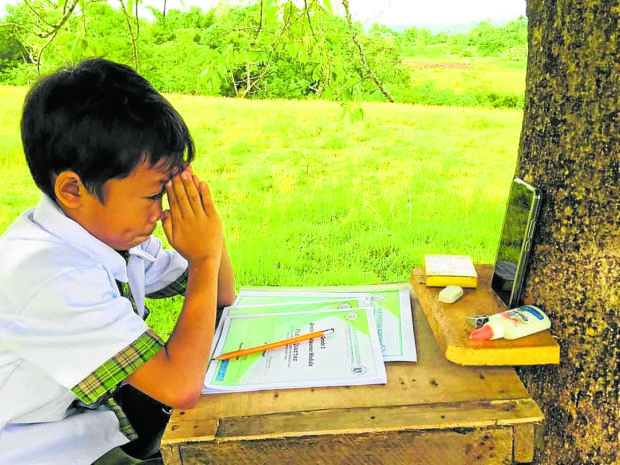Escudero backs faster, wider internet connectivity for distance learning

In order to access a stable internet connection, 6-year-old Arvin Jay Curangcurang in Alicia town, Bohol has to go to a small tree house to attend his online classes. Photo courtesy: Giecel Marie Curangcurang
MANILA, Philippines — The lack of internet connectivity across the country’s education sector should be addressed as hybrid learning is expected to continue, said Sorsogon Governor and senatorial aspirant Francis “Chiz” Escudero on Sunday.
In a statement, Escudero called for massive investments to allow for faster internet speed and wider coverage to make connectivity accessible to more students, as he expects hybrid learning to continue for some time even with the recent start of limited face-to-face classes.
“Even as we enter the new normal, expect that distance learning modalities will be here for some time,” Escudero said.
“Kaya kailangang mag-invest talaga sa internet connectivity para sa blended future distance learning ng ating mga estudyante. Huwag naman nating iwanan ang mga kabataan,” he added.
(So we really need to invest in internet connectivity for the blended future distance learning of our students. Let us not leave the youth.)
Article continues after this advertisementEscudero then cited data from the World Bank, which showed that lack of access to the internet and slow connection had adversely affected the education of Filipino schoolchildren and that nine out of 10 pupils cannot read.
Article continues after this advertisementThis means that the country’s learning poverty is now at a high of 90 percent by August 2021, from 69.5 percent before the pandemic, according to World Bank estimates.
Distance learning in the Philippines, meanwhile, also only covered 20 percent of households with schoolchildren, similar to Ethiopia, the lowest rate.
“Ito na nga ang masakit at hubad na katotohanan ng remote learning na ipinilit ipatupad sa buong bansa kahit sa mga lugar na wala naman o mababa ang kaso ng COVID-19,” Escudero lamented.
(This is the painful and naked reality of remote learning that has been forced to be implemented nationwide even in areas where there are no or low COVID-19 cases.)
“Nakaka-alarma na nga ang estado ng edukasyon bago mag-pandemya, tapos nabiktima naman ang ating mga mag-aaral ng magulong pagpapatupad ng distance learning,” he added.
(The state of education before the pandemic was alarming, and then our students fell victim to the chaotic implementation of distance learning.)
He then cited the case of Sorsogon where it could have been exempt from the remote learning imposed by the Department of Education (DepEd) since more than 50 percent of the barangays were COVID-free.
“Sa datos ng World Bank, mga 26.9 porsyento lamang ng mga estudyante ang may access sa internet sa bansa,” Escudero reiterated.
(According to World Bank data, only about 26.9 percent of students have access to the internet in the country.)
“Paano naman ang mahigit na 70 porsyento na wala na ngang gadget, wala na ngang internet at paminsa-minsan ay walang kuryente sa kanilang mga kabahayan? Pababayaan na lamang ba natin silang maging mangmang?” he added.
(What about the more than 70 percent who not only lack gadgets, but also have no internet access, and occasionally do not have electricity in their houses? Are we to let them stay ignorant?)
Meanwhile, the pilot run of face-to-face classes started on Nov. 15. The Department of Education said it plans to expand its implementation to more areas and schools by March 7.
RELATED STORIES
DepEd on WB report that 90% of kids suffer from learning poverty: It is being resolved
World Bank extending $110-million loan to DepEd
/MUF
For more news about the novel coronavirus click here.
What you need to know about Coronavirus.
For more information on COVID-19, call the DOH Hotline: (02) 86517800 local 1149/1150.
The Inquirer Foundation supports our healthcare frontliners and is still accepting cash donations to be deposited at Banco de Oro (BDO) current account #007960018860 or donate through PayMaya using this link.